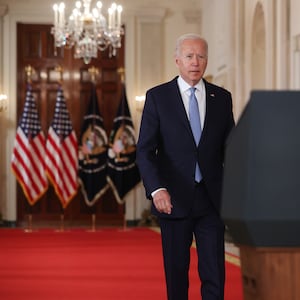No American political leader has had more high-level experience dealing with the war in Afghanistan than Joe Biden. He was chairman of the Senate Foreign Relations committee when the war began, and one of the first Senators to visit Kabul once US troops were on the ground. As vice president, he became the highest-level U.S. official to actively argue for dramatically down-sizing our mission there and focusing exclusively on counter-terrorism. President Obama overruled Biden, but he continued to push back on a policy that had gone off the rails.
When Biden ran for president last year, he promised to get America’s troops out of this war he knew so well. This week, he kept that promise.
Biden’s speech Tuesday revealed the depth of his experience and the convictions born of 20 years of grappling with the issues associated with the Afghanistan conflict. He began by framing the evacuation that concluded on Monday as an “extraordinary success” and then he detailed both the planning that went into that, his clear understanding of the complications and risks involved and his reason for ultimately sticking to his deadline and leaving now.
“I was not going to extend this forever war,” he said, “And I was not going to extend a forever exit.”
Biden noted that every military and civilian advisor he had supported the decision to leave, contradicting critics who said he had ignored military advice. He would certainly have been within his rights to do that. Over the years, he has heard a lot of bad advice of that sort.
On Tuesday, he spoke for himself, delivering the kind of speech a president should make at such a watershed moment for U.S. foreign policy. He explained why we were leaving. We had no clear U.S. national interest for staying once we had gotten Bin Laden and “decimated” Al Qaeda. And we had other priorities to which we should turn. He talked of his commitment to Americans who remained on the ground in Afghanistan and the mechanisms by which we would support them and remain engaged with that country. He spoke of how we would address terror threats and made it clear that ISIS-K, perpetrators of the bombing that claimed 170 lives including 13 members of the U.S. military, were in his cross-hairs.
In each instance, he was specific and often he was impassioned. His commitment not to sacrifice another American life in that country was especially clear and you could see this was a man who knew first hand the stress of having a son deployed to that country. When he spoke of the epidemic of military suicides, he revealed how well he understood and wanted to minimize the hidden costs of war.
In the face of waves of criticism for the chaos associated with America’s departure from Afghanistan, Biden has received widespread support from the public (a majority of whom according to a new Pew Poll support the decision to have ended the war) and from many in the foreign policy community (including me).
Nonetheless, moments after the speech was over, his seriousness in addressing the issues was met by commentary on network after network by analysts who were more interested in defending the narratives they had been peddling for the past few weeks. Some seemed offended that Biden did not focus on their special issues of concern or that he did not simply repudiate his own decisions, throw up his hands and say, “You know, Mr. Talking Head, you were right all along.”
Of course, often they were not right. By and large, he was and is. And if what he has done deserves debate and analysis, many of the public platforms we have for such debate have become too politicized to permit it, too dominated by reporters and pundits as concerned with their brands as they are with the facts.
At a moment like this, the end of a war, we have an urgent need to have just the kind of substantive discussion that the president’s remarks should have triggered, a discussion at the level of detail and insight offered by the president. But that is nearly impossible in this hyper-partisan era of toxic politics—and that should worry us all greatly. Because in many ways it is symptomatic of some of the key reasons we ended up with the deeply unsatisfactory outcome we have had in Afghanistan.
In the months and years ahead, we need to do a deep accounting of the flaws in our system, our politics and our society that led us to make mistakes on the scale of the Afghanistan War, the Iraq War and the "War on Terror."
While the war in Afghanistan began with a natural impulse to seek justice in the wake of 9/11, the policy process guiding it quickly was hijacked by opportunists with personal agendas that were ideological or industry-driven. Lies, often supported by partisan media machinery, became the foundations for a massive national endeavor.
Those lies were not effectively challenged. The Iraq War was an indecent and indefensible distraction from the mission to get Al Qaeda and Bin Laden, but the majority of the foreign policy establishment supported it and accepted many lies without questioning them. Herd mentality dominated.
Within the system, too few people stood up and spoke truth to power and challenged the Cheney-Rumsfeld-neocon leviathan. The mission into which we drifted at their behest in Afghanistan became an impossible one in a country that had defied such efforts for centuries.
A nation hobbled by grief blindly accepted the idea of a "war on terror" as if such a thing was right or even possible. The idea that a few hundred or thousand terrorists living in caves and on the run possibly could pose a real existential threat to the world's greatest support was blindly accepted.
It was a ludicrous notion but in the wake of the Cold War, seemingly adrift without an enemy, we used the provocation of 9/11 to spin a narrative that was unsupported by facts or analysis but happened to suit the agenda of a political clique and our military-industrial complex.
The discussion became so overheated that we violated our most deeply held principles. We accepted torture, rendition, Abu Ghraib, Guantanamo, violation of other nations' sovereignty and the deaths of hundreds of thousands of innocent civilians.
Today we hear arguments that ending this era of war weakens us with our allies and diminishes our standing, but nothing could have done those things more than the way we conducted these wars. That is not to say that our soldiers, sailors, marines, airmen, intelligence community, diplomats, contractors, NGOs and others did not often display great courage while embracing sacrifice, advancing our values and making the lives of those with whom they came in contact better. They often did. Biden was very specific in noting this. But we conflated their goodness with policy rightness and the results were devastating.
Demagogues suggested that it would be an insult to the lives lost on 9/11 and after to question our leaders, particularly our military leaders. But time and again, those military leaders made errors. Some misrepresented what was achievable. Others just played the Washington game, seeking to work their way up the greasy pole, saluting and saying "yessir" when they should have called for a different course. They failed to admit our errors, the costs of those errors and how elusive our goals were becoming.
Politicians with a few notable exceptions were the most cowardly of all, hostage to a toxic environment in which to admit a mistake was a political death sentence. They issued authorizations to go to war to our presidents that were essentially a license to battle on indefinitely, results and costs be damned.
One trillion dollars. Two trillion dollars. Three trillion dollars. All the way up to a debt burden including interest of $6.5 trillion according to one estimate as America mortgaged our futures on goals that could never be achieved. That fortune represents a generation of schools not built, teachers not hired, roads and bridges not restored, investments in research and development not made, defenses against next generation threats not undertaken, steps to address urgent needs like combatting the climate crisis not taken.
We just kept writing blank checks to presidents who kept failing to live up to the responsibilities of their offices. By 2010 there were 100,000 US troops in Afghanistan although the year before many including Biden had argued we should be drawing down our forces.
Bush and then Obama and then Trump could see we were faltering but none , until Biden, had the courage to actually end this era of cascading policy failures, failures of judgment, and failures of character.
They got away with those failures in part because many in the media failed as well. Sometimes they failed by accepting the jingoism of leaders without question. Sometimes it was because a twisted sense of "objectivity" led to both-sides-isms that gave credence to ideas without merit and defenses of the indefensible.
Others simply stopped covering the stories at all, letting them fade from public view as wars raged on and costs were piled ever higher. And the public too bought into a political discourse that divided America itself into warring tribes and replaced debate with reflexive name-calling.
Common interests were scoffed at. Serious exchanges of ideas among respectful opposing views were seen as weak, as betraying higher partisan causes. Those who wanted to rethink our approaches were castigated as traitors, un-American, un-patriotic.
We knew it was going wrong. 20 years later there are more terrorists in the world many times over than there were when our "war on terror began." Iraq was never really part of that war—until we drew the terrorists there and inspired the birth of ISIS.
While we sought to ensure Afghanistan could not be a haven for terrorists, it never stopped being one and all the while terrorist cells spread throughout the world, in part inspired by our abuses, our failures, the targets we presented.
For all those we helped, there were others we let down terribly. There were the deaths and there were the wounded, there was the suffering and the destruction. And we justified it and we enabled it to go on and on. And that, in the end, is on all of us.
So as we mark the end of this period, we owe it to ourselves to reflect and then, with seriousness of purpose commensurate with that demonstrated by the president and every member of his senior team, compile our lessons learned and then apply them with great urgency. This was one of the darkest periods in the history of U.S. foreign policy. We stumbled as a nation. It is time to lift ourselves up.



